#my meta
Text
I feel like people really underestimate the importance of Dick being the first Robin. Like, reverse Robin AUs are interesting and such, but I just hope people realize that in the context of canon, they would never work. The reason Batman and Robin ever works is because the first Robin was Dick Grayson specifically. Because Bruce would never have taken in any child if Dick's tragedy hadn't specifically happened to mirror his own experience. Dick Grayson was the only one Bruce truly saw himself in first, because the fundamental event that defines them is the same. And he sees the opportunity to help someone the way he was never helped, to make sure that Dick didn't go down the dark path he did. So, my point here is that the only one Bruce actually made the choice to take in, the only one who could kickstart it all, is Dick Grayson, because he is the only one with whom Bruce could immediately empathize and connect with.
This never happened with any other Robin. He took in Jason because he missed Dick, he took in Tim because Tim forced himself into the role, he took in Steph because he was trying to make Tim come back to being Robin, and Dick made Damian Robin. Of course, he loved all of them, and they all have their unique relationships with Bruce that are very important and inform their characters, and he does need them too. But he specifically formed this connection with Dick that made Dick the only person he ever considered taking in. It took a very specific set of circumstances in Dick's backstory that made Bruce commit an impulse adoption that just isn't really present in any other Robin's story. And the reason Jason or Tim or Steph or Damian or anyone else whom Bruce has taken under his wing even got that chance is because of the work Dick Grayson put into Bruce Wayne.
Before Dick, Bruce was reckless and didn't care at all about himself, to the point of almost being borderline suicidal. He was more brutal, more violent, etc. The reason all this changed, is because of Dick Grayson specifically. He was the one with whom Bruce opened up, with whom Bruce was forced to grow up, to take responsibility and learn to take care of both Dick and himself. Dick, to Bruce was the one who brought "color to their [his and Alfred's] monochrome lives." Dick Grayson's specific brand of happiness and joy changed Bruce for the better. Dick gave Bruce hope. This is true for other Robins too, but only because they followed the precedent that Dick Grayson set, only because they slid into his role (they have their own interesting relationships with Bruce, but this specifically is from Dick that other Robins carried on. A legacy, if you will). Dick Grayson turned Bruce into the kind of man who would become a serial adopter.
Without his influence, without his precedent, there would be no Batfamily, because Bruce would never have gotten to the point where he would be able or willing to take in someone else and care for them properly (It took living through his trauma again to get him to take Dick in lmao). Hell, there would be no Batman because Bruce would have gotten himself killed a long time ago if Dick hadn't helped him learn self-care. Dick knows Bruce best, because he understands him on a fundamentally deeper level than anyone else in the world. And he's the only one who can make Bruce open up at his rawest, most downtrodden state. He is the only one who can give Bruce at his lowest that kind of hope. There is no Robin without Dick Grayson. It's literally a tribute to his parents, using their colors and the name his mother called him. He created that identity as a symbol of hope. He helped Bruce become the kind of man who could and would let other people that he had to care for into his life. Without Dick Grayson, you can simply forget about any other Robin or the Batfamily as a concept even existing.
#DC#DCU#DC Comics#Bruce Wayne#Batman#Dick Grayson#Jason Todd#Tim Drake#Stephanie Brown#Damian Wayne#Nightwing#Red Hood#Red Robin#Spoiler#Robin#The Batman 2022#Robin I#My meta#Meta#TL;DR Dick Grayson is the only one who is emotionally intelligent enough to be an emotional crutch to pull Bruce Wayne out of the darkness#And without him Bruce never would have taken in anyone else#This post is mainly about The Batman 2022 btw#I see a lot of people asking for Robin but they want Jason to be the first Robin for some reason#And that's interesting but Bruce doesn't need just a Robin. He needs Dick specifically#That's what's best for his character progression and it makes the most sense from a thematic perspective too#But that's for another post
191 notes
·
View notes
Text
I would also like to say for the record that all of the sects in MDZS are not implied to be any ethnicity but Han Chinese and to be quite frank it is alarming when people try to say the text says otherwise.
Like, this is mildly related to the ask I just answered, and I know we've all seen the meta discussing how barbarianism and racism is (le gasp!) present in Chinese works. (Which, well, yeah. yeah it is.) BUT critically I think in trying to scrutinize and apply shit to MDZS/CQL where all the characters are very much Han, we're just turning up new ways of being racist towards minority ethnicities here.
Case in point: "the Nie are Mongolian"
I've seen this oft repeated everywhere in both meta and fic and...do we understand this??? is racist??? Like the most common justifications I see point to the fact that the Nie (in the live action)....ride horses...have braids in their hair...come from a butcher heritage...are "brutish" <- there's no canonical evidence of this last point btw.
Do we think this is the entirety of what being Mongolian means? Do we think these points add up to "they're subtextually Mongolian?" Why do we think that?
They're not depicted either 1) with Mongolian names 2) with Mongolian religious traditions 3) with Mongolian clothing or hairstyle trends 4) as being reacted to in text as anything other than Han Chinese by other Han Chinese characters. 5) They are depicted on screen by Han Chinese actors.
Like maybe if someone is subscribing to "The Nie are canonically Mongolian and written in a racist way by MXTX in text/depicted in a racist way by the CQL showwriters" they should. Examine what they think being Mongolian is irl.
Maybe the issue is not how sects are presented in CQL or MDZS but how exhausting it is to wade through this fandom where people will misconstrue shit into things that are somehow, more racist in an attempt to deconstruct racism in a system they do not fully understand.
#meta#my meta#it's not even really meta#i'm just so fucking tired of people claiming they're “fixing” racist takes by:#1) creating a racist take out of thin air in a situation that did not originally have a racist take#2) proceeding to somehow get even more racist with it
177 notes
·
View notes
Text
263 notes
·
View notes
Text
Nothing about Ka/taang precludes Katara being Chief of the SWT…
which is why it pisses me off even more that Katara didn’t get to have a role of any political importance whatsoever. It wouldn’t change anything about LOK’s storyline, and it would be fully in line with her character.
There’s a common anti-Zutara argument that Katara wouldn’t want to be Fire Lady, because she would want to rebuild and lead her own culture. I am sympathetic to that. Based on her canon characteristics, she might want to be a United Republic Councilwoman, Chief of the SWT, or just generally the Waterbending Master / Matriarch of the her tribe, which would be easier (though not impossible) if she weren’t married to the sovereign of another nation — I get that.
but the thing is…she didn’t get to do any of that, even though “wife of the Avatar” doesn’t contradict those roles. All the things that would be difficult for her to do if she were married to Zuko, she still didn’t get to do as Aang’s wife. She didn’t get to have a career the way her husband, or her brother, or her friends did.
so it’s extra hypocritical when Ka/taang shippers are like “but being Fire Lady would disempower Katara!” when Ka/taang canonically disempowered her! And KA fans are fine with that: they bend over backwards to justify why Katara doesn’t have a statue, or why she wasn’t there to protect Korra from the Red Lotus, or why she wasn’t at Yakone’s bloodbending trial. Yeah she got to live in the SWT — eventually, I assume, because in the comics she just follows Aang around — but what else did she get to do? Fucking nothing, apparently. Because to some people, the greatest honour for a woman is to be the hero’s wife.
#Kataang fans who don’t defend Katara’s stupid post-ATLA arc are fine#but I don’t think I’ve ever met one so#Katara deserved better#anti kataang shippers#anti bryke#Zutara#pro Zutara#Chief Katara#Fire Lady Katara#my meta
127 notes
·
View notes
Text
it’s insane to me that mariko and ochiba no kata/ruri are explicitly said by the creators and the characters themselves to have grown up very close, ‘like sisters’, and it’s implied they were closer than ochiba was to her actual blood sister (which was normal in terms of family dynamics and given their circumstances, I know, but still). their relationship might just be the most Homoerotic thing in the show, by pure accident, because it’s so intense and Fated that even the absence of any hint of romantic/sexual feeling ironically just magnifies how much their bond is too big to be captured by any conventional framework or labels. and I like this invention of their backstory from the original novel, it’s given ochiba lots more interiority and it’s a grounded and subtle means of saying More about them without having to spell it out. I really appreciate that their history is staged as an Entirely Platonic and Sisterly dynamic but one that had a deep formative influence on both of them, that lasted through all their years apart, right through to the tragic culmination of them as rivals.
the scene where Mariko walks into a room full of men baying for the blood of her lord/her by extension and is instead 100% focused on ochiba no kata, the only other woman in the room, whom she trusts to recognise the challenge she’s trying to pose, sent chills through me. their bond is the hidden fulcrum of the political machinations the show dwells on, more so than any number of the show’s political marriages or more conventional and visible means of politicking the many men in Shogun have, and the creators have touched on that in a similar register.
#shogun#shogun spoilers#toda mariko#ochiba no kata#mariko#shōgun#my meta#fellas is it gay to grow up like a sworn sister to another woman.
42 notes
·
View notes
Text
Let’s talk about parallels between Wilhelm and Sara in Season 3 of Young Royals
Because there are so many! This is a continuation of sorts of this meta that I wrote about them being A and B plot protagonists in season 1 and 2. I don’t know that I would describe them exactly that way in season 3, but I do think their plots, character arcs, and themes are meant to mirror each other very closely this season.
One of my favorite things about the parallels between Wilhelm and Sara this season is that comparing them really makes you hold Sara’s friendship with Felice on the same level as Wilhelm’s romantic relationship with Simon (and Sara’s with August) which I think is so important. Both Wilhelm and Sara go through breakups over the course of the season (I think Felice’s reaction especially frames her friendship breakup with Sara similarly to a romantic breakup, which I love). And both of their arcs are about mending those relationships.
Sara and Wilhelm both need to experience the world outside of Hillerska before they can mend those relationships. Sara is able to glimpse some independence, even just through getting her license. The whole world is open to her now, as Felice says in ep 6. I don’t know that she would have been able to make her decision not to go back to August without experiencing that freedom. And Wilhelm also needs to experience the full force of what life in the monarchy would be like before he is able to decide to leave it. Because of this they also act as our window into the two different worlds outside of Hillerska, the palace and Bjarstad. They create the larger context in which we understand Hillerska this season.
I love that both of their journeys of personal growth are symbolized through cars. Wilhelm is always getting trapped with his mom or a member of the court in a fancy car; it’s where almost all of the monarchy’s most onerous instructions on how to live are delivered to him. So it’s huge when he leaves his parents in the chauffeured car at the end of episode 6 and goes to find Simon, Felice and Sara in Sara’s beat up used car. Meanwhile, Sara has traded in horses for the car. This is stated pretty explicitly when her dad asks her if she would like to work with horses and she declines, saying that she has come to realize that horses are simply traded by rich people as status symbols, and her dad suggests she get her drivers license since it will help with any job she wants. In seasons 1 and 2 Rousseau is pretty heavily associated with August, along with the pressures put on August and the other elite kids at Hillerska to conform to expectations (@bluedalahorse has written the Bible on that here), so the fact that Sara swaps out the horse for a car that can take her anywhere feels like a step away from both August and the prescriptive norms of Hillerska.
Sara and Wilhelm both reject what they saw as their destined future. This is obviously really clear for Wilhelm; he assumed he would be prince and then king after Erik died, and his greatest moment of character growth is when he decides he doesn’t have to fulfill that assigned role if it will keep him from being happy and living authentically. I love the scene where Sara talks with her dad about her fears that she will fail in the same ways that he did because she also has autism and adhd. This is a less clear-cut assigned destiny, but that fear of becoming a self fulfilling prophecy is equally overwhelming, especially because Sara has already let down someone she cares about in a way that’s not dissimilar to how her father breaks promises. The fact that she’s able to come to terms with her dad’s influence in her life, but realize she really is in charge of her own future, is really powerful. (I also think it’s such smart writing about the way disability and internalized ableism can really affect your self image).
In order to break free of those predetermined destinies, both Sara and Wilhelm need to see a father/mentor figure as more than black and white. Wilhelm needs to acknowledge that Erik wasn’t perfect, and did help contribute to some of the abusive traditions of Hillerska. Sara needs to recognize that even though her dad isn’t a perfect parent, she still loves him for the care he is able to show to her and wants to have him in her life. I love that both Wilhelm and Sara learn to hold multiple conflicting emotions about their loved ones. They can be disappointed by some of Micke and Erik’s actions, but they can still value their relationships with those family members and recognize them as complex, complete people.
They also both go on a similar journey with how they see August. Wilhelm comes to recognize that August is both a perpetrator and victim of the class system and Hillerska’s systemized abuse. Sara similarly realizes that August is an adult who needs to be responsible for his own emotions. She’s no longer interested in saving him from his complex feelings of guilt, and recognizes his potential to find self healing. Both of those new assessments of August grant him more maturity and complexity than earlier in the show. (They also reflect the way that August grows, in fits and starts, over the course of season 3. If there was a season 4 of the show, I think we would really see August respond to Sara and Wilhelm’s new attitudes towards him in a way that would fuel future character growth).
Viewing Erik, Micke, and August more complexly also allows Sara and Wilhelm to forgive themselves for the ways they are similar to those people. They are able to acknowledge the shame they feel around their actions, but also forgive themselves in the same way that they forgive others.
Both Sara and Wilhelm have specifically let down Simon in pretty big ways (Sara by secretly dating August, Wilhelm by perpetuating the royal family restrictions onto Simon). But they are able to recognize those mistakes and reconcile with Simon.
Wilhelm and Sara both leave the monarchy (Wilhelm literally, Sara by refusing a relationship with August), but they also leave a kind of prescriptive romance behind. Wilhelm says no to having to monitor Simon, to having to roll out his relationship in a certain way to please the court, and to having their future together mapped out and their decision around children made for them. Sara says no to a smaller set of requirements, but the traditional ways that August sees romance are so influenced by the monarchy (which is in turn so influenced patriarchy) that they are similar in some ways. Sara says no to having to do August’s emotional labor, to managing him so that he will fit the image of a good heir. She says no to waiting for him to visit on weekends while he does military service. She says no to this grand plan that he has. (This was @bluedalahorse’s point originally that she shared with me, and honestly I think it's so smart). Wilhelm chooses a romantic relationship that he and Simon are free to create together without rules; Sara chooses a friendship based on honesty and support. Both are valid options that give the characters a sense of peace and freedom. And they would not have been able to make those choices without all of the growth they went through over the course of the season.
I think Sara and Wilhelm's arcs compliment each other so well, and it was one of my favorite things about season 3. I loved watching both of them get to grow so much and end up in such a happy place.
47 notes
·
View notes
Text
personally i think there should have been at least one episode where sokka collects aang and zuko and is like, “looks like we’re running low on supplies. time for a GUYS-ONLY field trip. three days of hunting and fishing and polishing our swords. y’know, manly warrior stuff. (aang, sotto voce: actually sokka i’m a vegetarian as you know--) you girls have fun sitting around braiding your hair and talking about your crushes” and then the entire episode is just zuko and sokka lying around by a river, plucking blades of grass and staring up at the stars confiding in each other their deepest feelings and most secret insecurities while aang braids flower crowns, and whenever the screen cuts back to katara and toph and suki, they’re fighting and screaming and hacking away at river pirates and evil spirits and legions of assassins and hired mercenaries with swords. you know, as girls do.
and when the boys finally drag themselves back to camp (they stayed up way too late discussing what true leadership really means and whether or not power always corrupts) they find suki and toph and katara lounging around with black eyes and fresh bruises and bloodstained weapons and sokka shrieks, “what were you guys DOING while we were gone???” and karata just shugs innocently and says in her sweetest voice, “oh, you know. just girly things”
71K notes
·
View notes
Text
LET'S TALK ABOUT LOKI'S SHOES (ACTUALLY, HIS WHOLE WARDROBE)
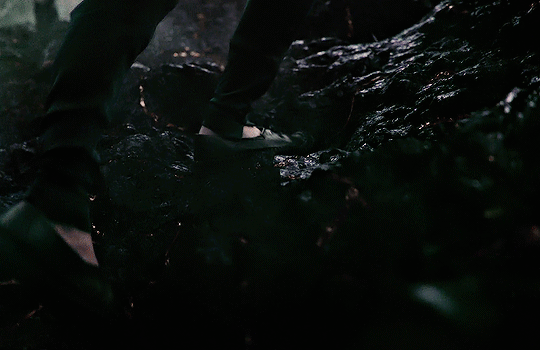
Production costs aside, clothes tell the audience about how characters think of themselves.
Loki's shoes in the S2 finale raised a lot eyebrows, but I find them quite fitting: they are comfortable, practical, and most importantly, they are humble. The camera brings this to our attention to communicate his evolution in character.
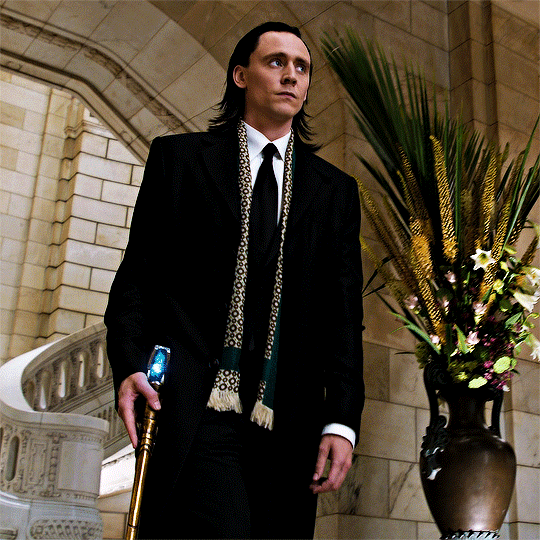

Loki has always dressed well, often times ostentatiously. Whether he is at war, passing as a Midgardian, or held captive as an Asgardian prisoner, Loki communicates his social class and sense of superiority through clothing. For him, clothing armors his fragile sense of self and against others' opinions of him. He intends to be perceived as deadly charming but ultimately unapproachable.
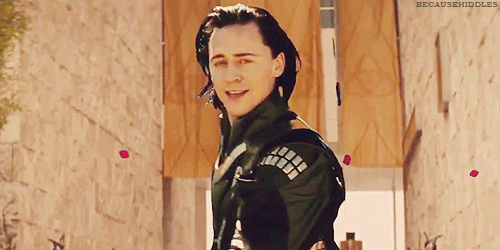
His attire in the first Thor movie is roughly equal parts green and gold, signifying his royal status. His style is dressed down for his brother's misadventures in Jotenheim, yet overall both silhouettes are lofty, princely, but not hardened or threatening.
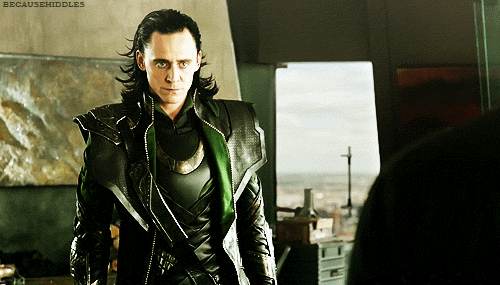
In Avengers, Loki's look has more black and leather, with exaggerated emphasis on his shoulders meant to intimidate as he assumes the role of villain. The silhouette is very hard, heavy, and edgy. Gold detailing is prevalent as well. Combined with the goat's helm, this is Loki's most pretentious outfit, which speaks to an undercurrent of low self-esteem and a compulsive need to impress. There's no mistaking he is the main antagonist of the story.

In Thor 2, Loki's attire is similar to Avengers but the overcoat is exchanged for a less bulky version (perhaps conveying he is less guarded now that the effects of the Mind Stone are no longer influencing him). Loki's role likewise pivots from the harsh lines of a villain to the more flexible edges of a reluctant villain-turned-ally. This aligns with his character arc when he protects both Jane and Thor, seemingly sacrificing himself.
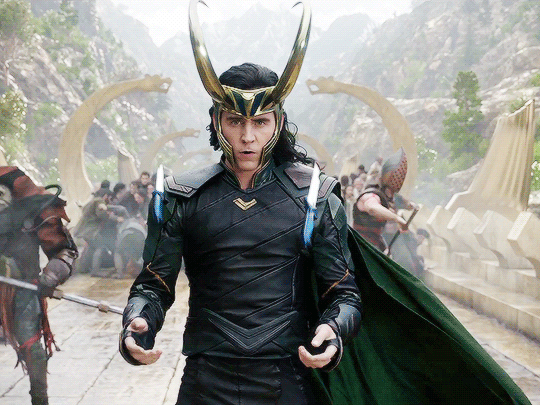
In Thor 3, Loki's silhouette is streamlined even further. The overcoat is done away with in favor of what appears to be a leather doublet, pauldrons, and vambraces. Gold accents are minimal. While stylish, Loki's attire is more practical than showy, and his helm serves the dual purpose of protection as well as weaponry. At this point in his arc, Loki has become a full antihero, joining his brother's side in rescuing as many Asgardians as possible, and eventually dying in a vain bid to protect Thor from Thanos.

The TVA does something very fun and interesting in taking away Loki's ability to dress himself. Since Loki cannot use his magic in the TVA, he is forced to wear the same clothing as his captor/advocate, who eventually becomes his best friend and peer.

Perhaps, on a subconscious level, this helped Loki to feel included. We know by his pwn admission that Loki fears being alone and desperately craves a sense of belonging. At the same time, he intentionally dresses to put people at a distance, thereby protecting himself from potential rejection at the cost of isolating himself further.
When Mobius gives him that TVA jacket for the first time, Loki seems uncharacteristically pleased. It is not an attractive jacket by any means, yet he neither scoffs at it nor refuses to wear it. Instead, Loki puts it on and is content when Mobius says it looks "smart" on him. He continues to dress like Mobius and, indeed, mimic some of his mannerisms such as placing his hands on his hips. Without clothing meant to push people away, Loki opens up, has more fun, and makes friends.
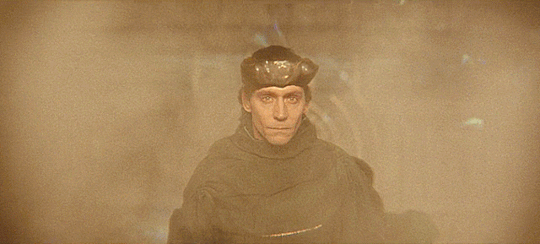
Loki's choice of attire as he assumes the mantle of God of Stories (and time) is fascinating. Setting aside the clear design inspiration from the comics, Loki's silhouette is soft, remarkably so. His colors are earthy hues of green, and the only bit of flare are the light gold trimming and crown. The look brings to mind the garb of sages and wise wizards rather than royalty or warriors. He's powerful yet approachable because there is humility in his bearing. And that humility springs from a well of healthy self-worth, self-love, and a deep love for others.
The shoes are not meant to be attractive. They are meant to help him ascend the throne, nothing more.
7K notes
·
View notes
Text
One thing I haven't seen a lot of talk about in the fandom so far is about the financials of this season.
It took us two whole months to get a confirmation of renewal from Max, and I talked at the time that I think there was probably a lot of heated negotiations going on at the time with contracts and that's why it took as long as it did.
I think we see a huge number of indications of the compromises that were made in order for S2 to be made. One obvious one that has been talked about is being making in in NZ instead of LA, to save $.
But there's also the eight episodes instead of ten. And then the cast aspect. One downside of moving overseas was having to fly out and house the cast, not just pay day wages.
We knew immediately about Guz Khan not coming back, losing Ivan as a character. At the time I was sad but I thought it had the air of a pretty harshly practical call. If you went through the main recurring cast and said okay which character will affect the fewest things, has the least character interactions of anyone? It would be Ivan. (With the only competition being The Swede IMO, but he's Stede's crew and therefore a little more central.)
And then this season started and we got first The Swede sidelined and taken out of major scenes. And then I noticed that different members of the crew were simply absent for long stretches, like Wee John isn't around for ep 5 at all. And then Buttons takes flight.
Lucius and Pete aren't at the party for most of it. Fang isn't in the torture scene. Roach and Fang aren't in the bar. Etc. SCHEDULING IS HAPPENING.
The new characters are almost entirely played by NZ local actors, which is great, but also...cheaper.
In other words there are big signs that they did everything possible to give us a giant cast of almost everyone we love from S1, and cool new characters, in the most economical way possible.
And I'm grateful for it. I'm grateful we got S2, and it looks great, and it's well written, I'm having a blast, and we get to spend more time with this awesome cast.
But I also kinda think it needs to be said that the cost-cutting shows. That it shouldn't have been only 8 episodes, the pacing is off. That we miss every time someone from the ensemble isn't on screen.
That despite what they've put on screen looking very good, there's far less costuming budget, there's less elaborate sets, and it's a little disappointing. And it's clear it's not a lack of will or talent or vision but blatantly lack of money.
Look, streaming networks want brilliant shows that people love (that will get them to subscribe) but they very don't want to pay anyone to make them. That's like, the whole moment we're having right now.
Max puts out promos about how great it is to not have unions messing shit up in NZ. Well I have friends who are union costumers in LA and guess what union costumers did amazing last season. This season, well, I guess Stede got three whole shirts, so that's cool.
So I dunno. It's just stuff I think about. I'm not trying to be negative about the show in any way. I'm extremely happy with this season; I love it more than well, possibly any show I've ever been in fandom for.
But I see you, Max. You're cheap. You weren't that cheap when you were called HBO.
5K notes
·
View notes
Note
I started reading LOCH after seeing do many posts about the adaptations, and now I can't help but wonder: Do you think the Jin Sect in MDZS was an intentional reference to the Jin dynasty villains, what with their flaunting an imperial color in their clothing and their lots and lots and lots of scheming as opposed to bald-faced battle skill? Or are "Jin" villains in general just enough of a genre convention that MXTX passively absorbed it?
Okay so, I think this is a bit of a conflation of a number of different things, and I'll explain in more depth, but upfront:
No, I do not believe the Jin "villains" in LOCH share any similarity in any way with the Jin Sect in MDZS passively absorbed or otherwise.
Let me explain:
The Jin mentioned in Jin Yong's Legend of the Condor Heroes, especially the Wanyans -- Wanyan Honglie and the rest of the Jin imperial family -- are based firmly in the real history of the fall of the Southern Song dynasty. (circa 12th century). The Da Jin/Jin Empire was created by the Jurchen people and occupied much of what used to be the northern portion of what, at the time, was considered Song territory. (see wikipedia article here for more nuanced discussion of what the "Jin Empire" was.)
The Jin Sect <- aka a bloodline sect of Presumably Han Chinese People Surnamed Jin (we have no canonical evidence to believe any of the sects presented to us in MDZS are of any ethnicity besides Han btw), are based in Lanling County in the Shandong Province of a historical fantasy time period. There is no resemblance between the two. The Jin in MDZS presumably wear a lot of yellow/gold because their surname itself means...yellow/gold.
If I DID have to say "I think the Jin were inspired by xyz from Jin Yong's novels" I would probably think that they were inspired in part by the Songshan Sect in one of Jin Yong's later novels Xiao Ao Jianghu, because their sect leader Zuo Lengchan is a greedy despotic semi chief cultivator type persona who preys on jianghu infighting and the youth of various sect leaders in the Five Mountain Sword Sect Alliance after he's politically knocked off other older more experienced sect leaders, is obsessed with a cultivation manual that will make him #TheMostPowerful, commits atrocities like massacring whole sects, and the Songshan Sect wears....a lot of yellow.
Also as an addendum: "Jin" villains are not remotely a wuxia genre convention. They can't be passively absorbed. The discussion of the Jurchen people in LOCH and why they are cast as villainous in the novel is directly correlated with the colonization of the Han Chinese during that time period in history.
20 notes
·
View notes
Text
Actually Batman shouldn't kill. The reason he doesn't kill is because he believes wholeheartedly in the good in humanity and the sacred value of all life. His belief in rehabilitation and second chances is meant to put him in contrast with the corruption in Gotham, both with regard to the corrupt justice system/police force and the criminals, who all take lives with no regard for its value. Being surrounded by such fatal violence and corruption on a systemic level and even being affected by it on a personal level, and yet finding the strength to not only rise beyond it, but to fight for a way to fix and save the very cause of such unfathomable pain is what defines the character of Batman. Batman is about protecting the innocent and fighting against injustice so that what happened to him never happens to anyone else. Batman is about breaking the cycle of killing and rising beyond it to become a beacon of hope for a better future. Batman killing and taking justice into his own hands is literally the antithesis to his character. If your Batman kills, then he is not Batman.
#What part of killing makes you no better than the ones you are fighting do some people not get#He believes in rehabilitation not punishment#That trait is fundamental to his character and if you take it away you take away what makes Batman Batman#I'm sure everyone knows the “punisher in a funny hat” quote so please remember that again#DC#DCU#Bruce Wayne#Batman#Batfamily#Batfam#Meta#My meta#DC Comics
1K notes
·
View notes
Text
On how Crowley and Aziraphale felt during the kiss (but mainly Crowley here):
Ok so first, the main idea for this huge meta is that a LOT of us noticed how the music from the kiss scene is similar to the nebula one, right?
Second, a lot of us also correctly noticed the parallels between the kiss and how it was to taste food for the first time for Aziraphale: bc of his reactions, the hand on lips, the similar way MS acted both scenes, the little inhale etc. So how was it for Crowley?
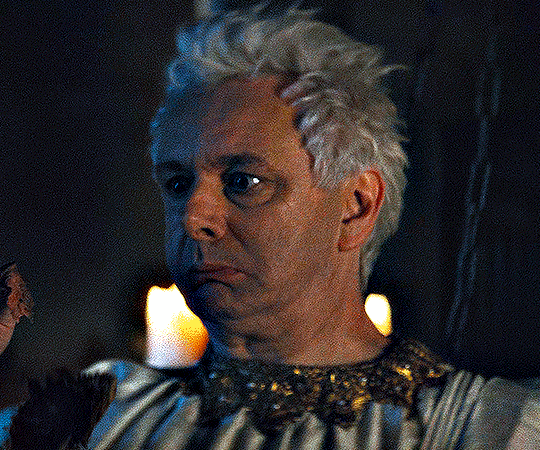
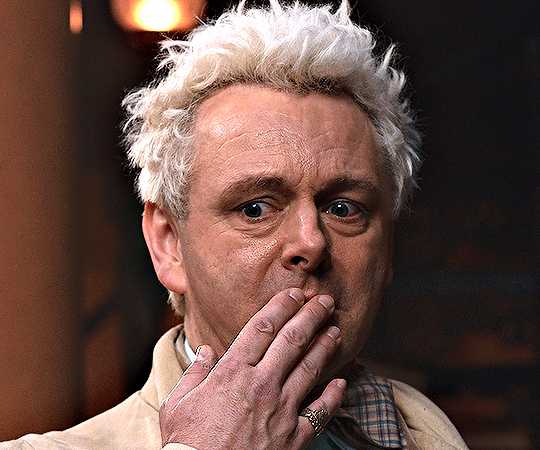
Aziraphale's reaction to the kiss is practically a puzzle to solve on its own, so it's fun to analyse it, but basically, in a few words, Aziraphale kissed Crowley and he discovered he was physically starving for him, longing for him, yearning for him, for his kiss, and he had no idea. Just like with the ox. And now he needs to gorge himself in him but he can't. Great amazing heartbreaking chef's kiss someone give MS an Emmy.
But there's already so much amazing meta out there about Aziraphale x Ox ribs x The Kiss that I want to focus on Crowley here, and on the music.
So back to the music. The song in "Before the Beginning" and the song that plays during The Kiss (I Forgive You + Don't Bother) are so similar. They're not *exactly* the same, but they're totally reminiscent of each other. The viewer is immediately reminded of those chords that played in the opening scene. It's no coincidence that the fandom was talking about this fact only minutes after first watching those final fifteen minutes. This is an obvious intentional choice for storytelling reasons (David Arnold is a genius).
I have no expertise whatsoever when it comes to music, so I asked our friend @otsanda to see if that made sense and not only it does and she explained it, but she also uncovered so much more hidden meaning in all of it (musicians are amazing), so check out her meta about the music that not only serves as evidence to what I'm proposing here but it also has so much more juicy information in it 💖.
Back to the point: WHY thought? Why choose a similar song? Why intentionally COMPOSE a similar song for that moment?
Hear me out. WHAT IF, by reminding the audience of the creation of the nebula, they meant to convey to us that, for Crowley, kissing Aziraphale gave him the same feeling that creating his stars did?
THAT'S what the music is telling us. THAT'S why it makes us remember "Before the Beginning". It may sound cheesy, but Crowley may have literally seen stars when he kissed Aziraphale. He couldn't react accordingly (just like Aziraphale couldn't), bc it was an overwhelming and extremely sad moment (the music is also telling us that) for both of them. They knew it was ending . They were both having a moment of huge revelation that was fated to not come to completion. Crowley was right, it was too late.
It makes sense to show Crowley's feelings through the music, bc he was the one who started the kiss, and also he was wearing sunglasses in that scene, it's different from a character like Aziraphale that has all his million expressions for everyone to see at all times. And they've been doing this ever since s1 with the Queen songs that play in his car or in the background.
So my point is: the same song being used there makes me wonder if kissing Aziraphale finally gave him what he lost. His purpose. What Aziraphale was trying to give back to him by taking him back to heaven. There's no need for Heaven. Just kiss him, Aziraphale, and there he'll find the stars you want to give back to him. There you will one day see that smile on his face you saw Before The Beginning. Neil Gaiman and David Arnold I am in your walls 😭
This is what may lead us to see this happiness in Crowley again (not the action of kissing itself, of course, but what it represents to their relationship, them being together, them being an Us).
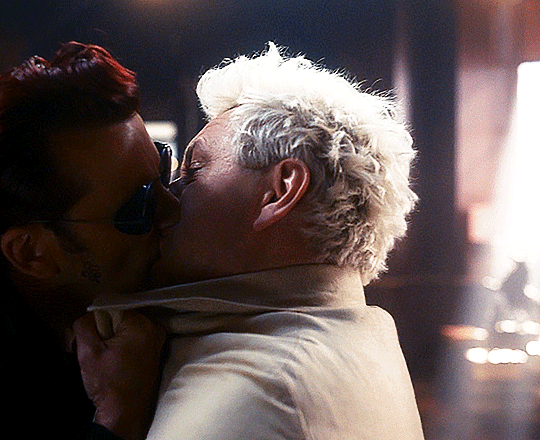
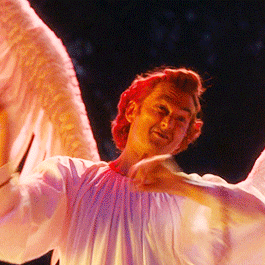
As @otsanda said: from the music we can interpret that that moment was a Revelation for them. Almost a religious experience. Crowley found his purpose again. What he'd been missing the whole season (or even his whole life since the Fall, but we've seen him especially depressed this season).
I'm not even getting into the poetry of how one can interpret the parallel to the angel's reaction to the kiss as carnal, and the demon's as religious; that would be another whole essay but let's just agree that it's incredibly beautiful. (Let me be clear that I mean here Aziraphale's reaction is carnal specifically for Crowley, and Crowley's is religious specifically for Aziraphale, not religious as in "worshipping god")
"Do you ever wonder what's the point?" Crowley asked in s2e1. The point, for him, is Aziraphale (if you've seen The Good Place you know what I mean). I hope he figured this out with that kiss, even as heartbreaking as it was. Even if it was a (temporary) separation kiss. (I hope Aziraphale figures this out with time too, that he's more than enough to make Crowley happy, that Crowley doesn't need Heaven, or stars, that Crowley needs him.)
Maybe that's why Crowley didn't leave and kept waiting outside until the very last moment.
Aziraphale and Crowley both bit the apple at the end of s2. There's no turning back from that Knowledge now.
Edit: I just have to add here this brilliant colour analysis of the nebula scene by @halemerry. And it's pointed out that during the nebula formation there's a moment when it looks like two people embracing. And the fact that a similar song is used in the actual Kiss scene I just... I have no words
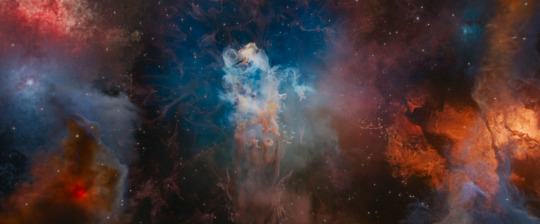
#good omens 2#good omens#ineffable husbands#good omens kiss#my meta#good omens meta#before the beginning#i forgive you#don't bother#crowley#purpose#knowledge#music#david arnold#reactions to the kiss#the angel's carnal reaction vs the demon's religious experience
4K notes
·
View notes
Text

trying to boil them down to their bare essentials for easier writing…. i don’t think i’m doing it right 😭
#homestuck#jane crocker#jade harley#jake english#june egbert#john egbert#hsmeta#op#my meta#<- barely lol
1K notes
·
View notes
Text
"There must be something I can do for you."
OK so I have been trying for the longest time to make sense of why the fuck they KEPT GOING WITH THE MAGIC ACT when they realized they couldn't do miracles. And I think I've got it.
Once again, it boils down to misunderstanding and miscommunication (surprise surprise):
I fully believe Aziraphale thought he was doing Crowley a favor by offering to do his magic act. Crowley’s in trouble with the theater, the alcohol he was going to sell is ruined because of Aziraphale’s shenanigans at the church. To take some of the pressure off Crowley, he offers to perform.
Here's the thing, though. Aziraphale DOESN'T think he's a very good magician. Just look at how nervous he is! He has zero confidence. Even the coin trick he does for Crowley, he's shocked and delighted when it actually works because he doesn't think it's going to. He's pretending for Crowley's sake because he's trying to get Crowley out of the hot seat with the theater.
That's also why he chooses such a dramatic and dangerous trick for the stage: he has to make it good for Crowley.
Meanwhile.
MEANWHILE.
Crowley sees Aziraphale's offer to do the magic act purely as another one of Aziraphale’s whimsies. Which of course he is going to indulge, because he's a lovesick fool. He goes into FULL SUPPORTIVE HUSBAND mode, builds up Aziraphale's confidence, agrees to do the highly dangerous trick because Aziraphale wants to, because he thinks Aziraphale thinks he's good at magic, because he thinks Aziraphale really wants to get up on stage and perform, and he just doesn't want to see Aziraphale embarrassed... (Sound familiar???)
So. We get to the stage. Aziraphale doesn’t actually want to be there, but he's doing it for Crowley; Crowley doesn't actually want to be there, but he's doing it for Aziraphale. BOTH of them are complete idiots, because they're so enamored with each other and so fucking COMMITTED that neither of them wants to back down when they find out they can't do miracles. They just really want to make their husband happy--so badly that they're willing to risk discorporation for it.
In conclusion: they are idiots and I love them but THEY NEED TO COMMUNICATE JESUS CHRIST
It's no wonder the season ended like it did...
#Does this make sense to anyone else??.#Because I was just so confused as to why they kept going with it#Also the miracle blocker like#This is an UNDERUSED item in the feud between Heaven and Hell#SEVERELY UNDERUSED#But that's for a different post I guess#Good omens#Good omens 2#Good omens meta#My meta#Ineffable husbands#aziracrow
2K notes
·
View notes
Text
the anti-Zutara criticism that “Zutara shippers are teenage girls who only like the ship because they self-insert as Katara” is actually so funny because how does that delegitimize the ship? So…girls who relate to Katara like Zuko, and they think Katara would like Zuko, and that’s bad because…girls are wrong? Girls are shallow? Girls don’t know what’s good for them?
Anyway if I were a grown ass man who created a fictional teenage girl that lots of real teenage girls relate to, and these girls believe she would like character B instead of character A, I hope I’d have the humility to say to myself “hmm I wonder why people who relate to this character’s feelings and motivations think she would react this way” instead of jumping straight to “these girls are doomed to like toxic relationships”
(And I know Zutara shippers like the ship for many different reasons, and self-insert is not the most popular by a long shot, I’m just saying that the criticism of self-insert stems from dismissal of what teenage girls like, and that feels kinda misogynistic to me)
#Zutara#pro Zutara#anti bryke#katara#Anti kataang#not really anti kataang but tagging it just in case#I should tag this “pro teenage girls”#My meta
988 notes
·
View notes
Text
kind of obsessed with the decision to start so fully in media res that the bad kids were not only down spell slots and hit points but also deeply emotionally exhausted from a summer full of unrewarded heroism and fully committed to new npcs. like what a good way to fully suck your audience back in and also honor the lapse of time irl and in story time. truly no one does exposition like D20, Brennan is never not smart about perfectly balancing world building, character background and plot hook. and since we know the characters and the world we could start this campaign fully *in* the plot right from the word go. and then instead of an inciting incident leading to a battle, or a break from the character's normal reality causing them to fight for the first time (ie the first season), the end of this battle is the inciting incident for the rest of the season. being in combat and saving the world *is* the normal reality for the bad kids. and this sets up FHJY as a campaign that can be focused on something other than that, because the story starts at the end of that normality, or when something in that normality shifts. (is the inciting incident Fig's new powers? or how this battle resolves? TBD! but I have a good feeling about it regardless). SO smart. because if we went from sophomore year straight to a campaign that was focused more around school and the normal experience of being a teen? it would feel weird. but this is the perfect set up.
1K notes
·
View notes